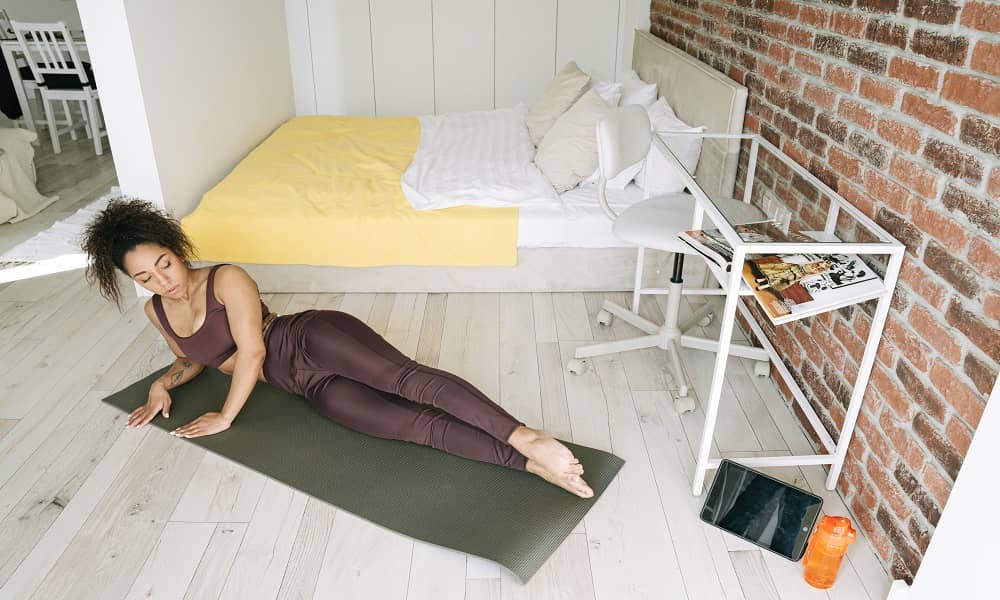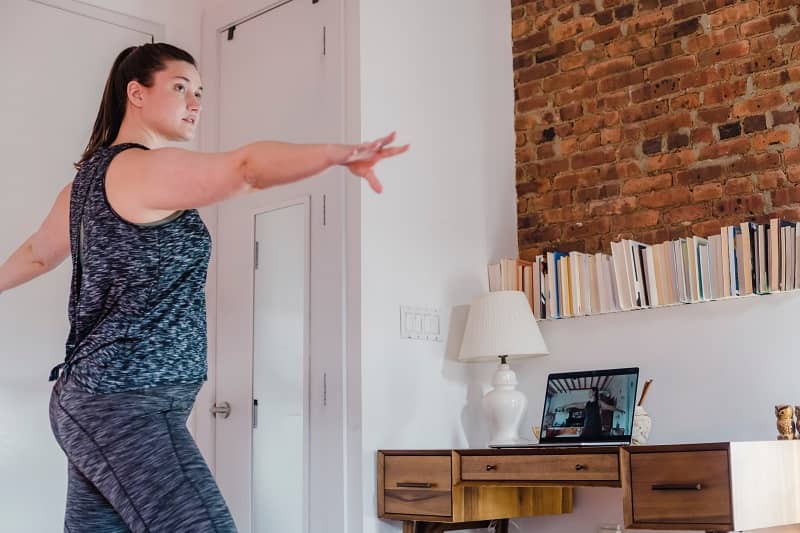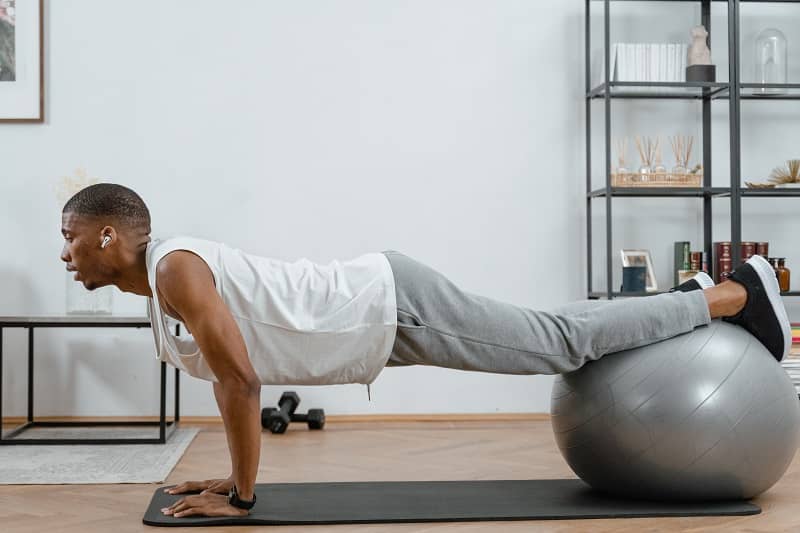


04 Oct Is It Good to Workout before Bed | What is the Best Time to Exercise?
A recent meta-analysis published in the journal Sleep medicine reviews addressed the effects of doing high-intensity exercise before bed on the sleeping habits of healthy adults.
Key Study Highlights
- A combination of factors interconnects to intensify the effects of exercise on sleep.
- The timing of exercise affected the sleep duration.
- Specific types of exercise influence sleep.
- Evening exercises have different effects on early risers and night owls.
Exercise is often correlated with the healthy start of a day and a good night’s sleep; hence, it’s important to squeeze it into your everyday schedule.
But sometimes life gets in the way.
Who has got time to work out on a busy morning before work, right? So, as a result, all you are left with is often a nighttime workout.
However, immediate working out before bed is seldom recommended, simply because it intensifies heart rate and body temperature.
An up-to-the-minute meta-analysis by Concordia researchers further validates how an hour of acute workout before sleep can affect healthy males and why working out before bed can be a bad idea.
Working Out Before Bed: What NEW Research Shows?


Here’s a complete run-through of the study.
Premise Of The Study
Generally, moderate-intense exercise is encouraged for better sleep, whereas an HIE (High-Intensity Interval Exercise) or workout before bed is not recommended.
The study published by Concordia researchers evaluated data and studies to analyze how a single session of intense workout, hours prior to bedtime disrupts the sleep of middle-aged as well as young males.
Moreover, while no two bodies are the same, there are certain factors that interconnect to intensify the effects of working out before bed.
Method Of Study
A systematic review and meta-analysis were conducted to determine how dreadful or regular exercise derange the nighttime sleep of healthy adults.
- To assess the risk of bias in the included studies, the revised Cochrane risk of bias tool for randomized trials was used.
- And for meta-analysis, the random-effects model was used.
- Good sleepers were compared with those with no exercise control.
- Six databases (PubMed, EMBASE, Scopus, Web of Science, CENTRAL, and PsycINFO) were searched and the studies subjectively and/or objectively assessed the sleep of inactive and physically fit good sleepers after evening HIE.
To elaborate, in the meta-analysis, 15 studies of evening HIE with a total of 194 participants were used.
Results Of The Study
Here is what the outcome of the study indicated:
- When compared with no exercise control, a decreased rapid eye movement sleep was witnessed in those who completed HIE 0.5-4 hours before bedtime.
[REM stage of sleep is associated with dreaming experiences. And studies suggest that decreased REM sleep can negatively impact cognitive functions in case the information is complex and emotionally stimulating.]
- A regular high-intensity exercise during the evening didn’t affect nighttime sleep.
- Sleep benefits like promotion of sleep onset and increased sleep duration were witnessed when the exercise ended 2 hours before bedtime.
- When exercise ended less than 2 hours before bedtime, it negatively impacted the duration of sleep. It took long hours to fall asleep and the participant’s sleep duration was decreased.
So…
Is It Good To Workout Before Bed: Key Inferences From The Study
Further analysis of working out at night depicted the following key inferences from the study:
- Performing cardio before bed or any HIE in the late evening can cause disrupted sleep in morning people. Therefore, it’s important to consider whether you are a morning person or a night owl.
- In terms of deep sleep and onset, cycling was found to be more beneficial.
- If possible, a healthy, young, and middle-aged male with no sleep disorders should perform an early evening exercise.
- Working out before bed during different times in the evening can disrupt sleep. Hence, individuals need to maintain a steady exercise schedule.
- High-Intensity exercise performed for 30-60 minutes increased onset and sleep duration.
- Sleep hygiene, avoiding heavy meals, and drinking a lot of water must be considered before going to bed.
Considering the results of this study, straining yourself with acute high-intensity exercise minutes before going to bed will impact the quality of your sleep.
These findings also clearly state why working out before bed is a bad idea and what are the benefits of working out in the evening vs night time.
Exercise and sleep are key ways to stay healthy, productive, and live longer.
Hence, if you are worried about how many hours before bed should you exercise, the answer is…
How Long Before Bedtime Should You Exercise?
There are clear benefits of working out before sleep.
However, to experience meaningful benefits, it’s vital to analyze how long before bedtime you should work out.
The duration between exercise and sleep may vary according to the type of workout.
- Aerobic exercise releases endorphins that keep some people awake. Thus, such individuals are recommended to exercise at least 2 hours before their bedtime.
- It’s quite obvious that exercises raise core body temperature and it starts to fall only after 30-90 minutes.
So, overall one needs to work out at least 2 hours before they doze off.
However, many people find conflicting ideas about working out in the morning and later on in the day when they have time. So, which is better?
Should I Exercise In The Morning Or Evening?
So, what is the best time to work out?
Are you struggling to find time to work out between job, family, errands, sleep, and hobbies?
While some people don’t have a choice when it comes to time for a workout, others simply have preferences as to what time of the day they want to break a sweat.
Both morning and evening workouts have their own pros and cons.
How and what you want to achieve in terms of fitness also affects the type and timing of your workout.
To put it simply, the best time to exercise is whenever you can as long as you are consistent and dedicated.
Avoid an intense workout just before bed, and that’s it. The rest depends on your goals.
Regardless of the fact, whether you do it in the morning or in the evening, simply for a healthy lifestyle or to reach a certain fitness goal, only consistency can help you see real results.
However, if you are exercising to reach a fitness goal, research has shown that the time of the day you are working out will surely have an effect on it.
For instance, you must completely avoid to exercise at night to lose weight.
Nevertheless, if you are feeling stressed, an afternoon or early evening exercise will heighten your metabolism, help you relax, and have a good night’s sleep.
So…
Are Evening Workouts Effective?
I’m sure you must have heard time and time again that morning is the best time to work out. And it even feels right and logical.
But every person’s body is different; not everyone can get themselves to hop out of the bed and head to the gym.
And due to changing conditions, a good amount of the population prefers to work out before bed in the evening.
And despite the common belief that evening workouts leave the exercisers restless and too hyped to sleep, it was found in the research that if performed hours before sleep, the early evening may be the best time to exercise for many reasons.
10 Benefits Of Working Out In The Evening



Some of the benefits that make the evening the best time to work out are:
- Improvement In Physical Performance
- Better Stimulation Of Hormones
- Helps Relieve Stress
- Helps Get Rid Of Bad Habits
- Boosts Your Nutrition
- Better Sleep
- Help Focus Better
- Better Muscle Strength
- Control Over Meals
- Prepare For A Better Tomorrow
Here’s how evening workouts work in offering all these amazing benefits.
#1. Improvement In Physical Performance
If you want to push yourself and test your limits, it’s better to save yourself for an evening workout.
Even research has shown that most people function better at the end of the day.
In a 2013 study with 20 male participants, four markers of physical activity were analyzed, including oxygen uptake and anaerobic activity.
And it was found out that the participants were able to work out 20% harder and longer than morning time.
#2. Better Stimulation Of Hormones
If you are into bodybuilding or simply concerned about your declining testosterone levels, working out in the evening might assist you in boosting the youth hormone.
As a result, it will not only help you build muscles but also help you overcome the signs of aging.
#3. Relieves Stress
After a long day, you might feel like slipping into your PJs and crawling under the sheets. But hitting the gym can be the best to blow off the stress and calm before bed.
The generation of endorphins during a workout helps you relax hours before you hit the bed.
#4. Help Get Rid Of Bad Habits
A tough day at work unknowingly makes you develop night-time bad habits, such as snacking, drinking, smoking, and binge-watching.
Make some room for evening exercise.
And once you get a hang of it, you are not going to miss your old habits.
#5. Boost Your Nutrition
The preconceived notion that eating before bed leads to weight gain has been largely debunked.
As long as your meals are concise, nutritious, and you don’t devour them immediately before you go to bed, you are good to go!
A 2015 study indicated that young, active individuals when consumed protein shakes after a workout and before bed showed a better concentration of amino acids as compared with those who consumed the placebo.
This indicated that protein was better digested during sleep.
#6. Get Better Sleep
As long as you are doing moderate exercises like light walking or cycling, even working out at night will not prevent you from catching up on the Z’s and slip into the deepest stages of sleep.
All that you need to keep in your mind is that it should be a moderate exercise and not a high-intensity exercise, and it should take place at least 2 hours before your bedtime.
#7. Help Focus Better
No one ever prefers a crowded gym.
Although it may energize you, it’ll also mean waiting for the equipment and machines and a little chit-chat.
An early evening workout allows you to avoid crowds and help you focus on what you came to do.
#8. Better Muscle Strength
If maximizing muscle strength and getting stronger is your fitness goal, it’s advised to plan your workout at the end of the day.
The reason behind this is the fluctuating hormones and body temperature.
Therefore, prefer lifting weights in the evening to enjoy key benefits.
#9. Control Over Meals
It’s no longer a secret that eating a large meal before bed is not good for your health.
And if you develop a habit to exercise before sleep and in the evening, it’ll automatically lead you to have smaller and more nutritious food.
Hence, working out hours before bed and not eating large meals will not only take control of your appetite but will also aid in weight loss.
#10. Prepare For A Better Tomorrow
Working out in the evening benefits also include an incredible tomorrow.
A sweat session and a deep relaxing sleep help you feel rejuvenated the next day. You feel refreshed and ready to take what life throws at you.
If you want to relish these benefits and are willing to experiment, try working out before bed in the evening and see positive changes both in your mind and body.
The Outlook
Working out before bed is often discouraged but if a late workout jibe with your schedule, all is not lost.
You can do every bit of exercise at the end of the day and not miss out on any of the benefits.
All you need to be cautious of is:
- Make sure you don’t eat a lot before exercising.
- Always finish working out at least 2 hours before bedtime.
- Don’t do high-intensity workouts and stick to moderate exercises only.
- Be consistent and committed to your exercising schedule.
- Don’t forget to maintain sleep hygiene before you hit the bed.
- Work out in a close-lit area near the entrance.
So, while you may miss out on the morning boost, there’s plenty to gain from being a night owl at the gym, given you take care of the above points.
Enjoyed reading this post? I would love to read your thoughts down in the comments section.
SOURCE STUDY:
The effects of evening high-intensity exercise on sleep in healthy adults: A systematic review and meta-analysis – Sleep Medicine Reviews, Volume 60, 2021
ALSO READ: Aerobic Exercise Postpones Degenerative and Metabolic Disorders



No Comments